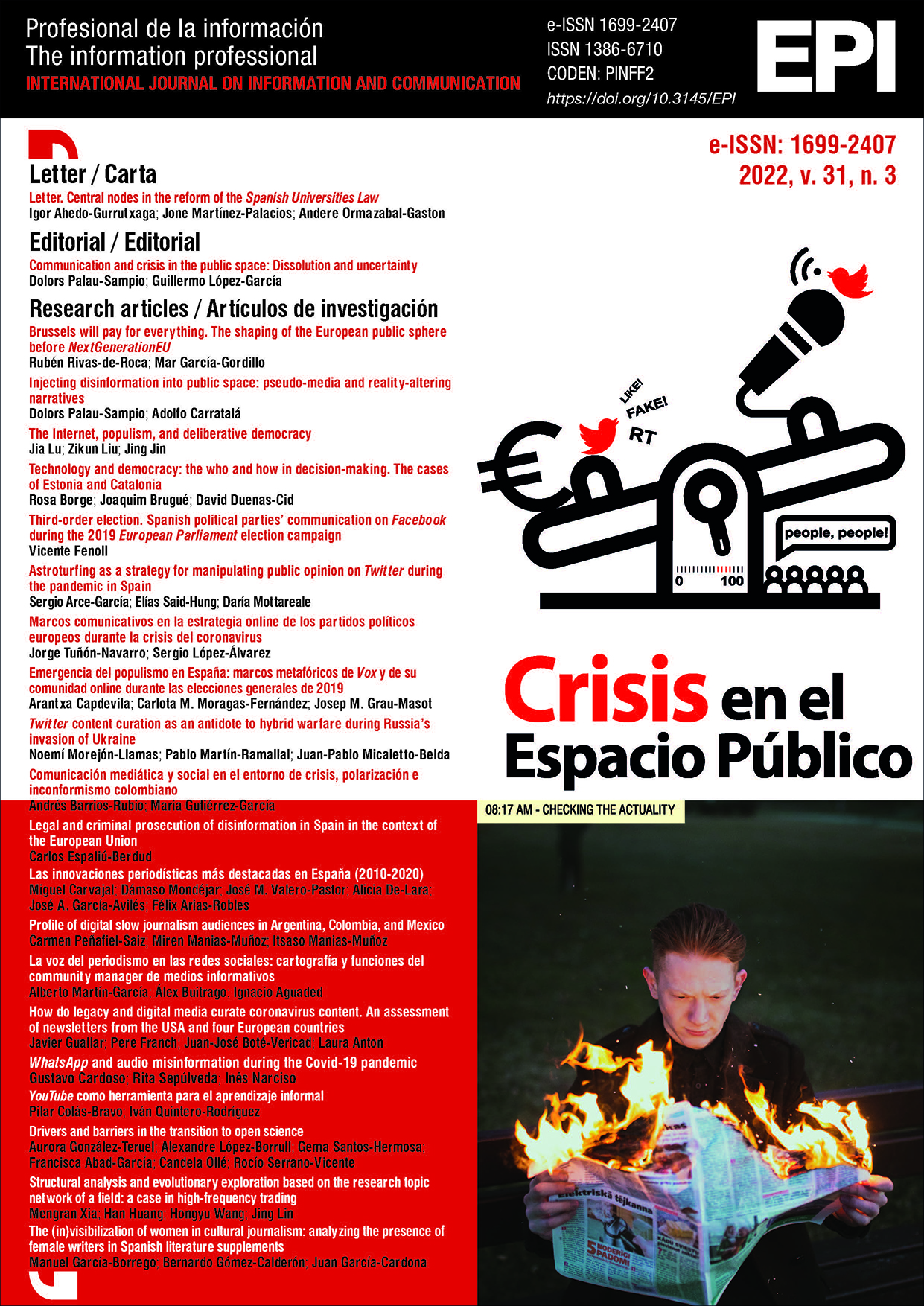Legal and criminal prosecution of disinformation in Spain in the context of the European Union
DOI:
https://doi.org/10.3145/epi.2022.may.22Keywords:
Disinformation, Fake news, Freedom of expression, Freedom of information, Censorship, Cybersecurity, Online platforms, Traditional media, Legacy media, Soft law norms, Hard law normsAbstract
Disinformation poses a very important and growing risk to our society, either alone or in association with other hybrid threats, which is being addressed at both the international and European Union (EU) as well as national level. Within the EU, a multidisciplinary and cooperative approach has been advocated between all the actors involved, in contrast to the strong regulatory perspective traditionally adopted in the history of European integration within the EU framework. For this reason, together with the inherent limitations imposed by the nature of the right to freedom of expression and information on any possible administrative censorship or criminal punishment, Spain has adopted only one recent regulation (Decree PCM/1030/2020) to establish the Spanish procedure to combat disinformation as required by European directive. Moreover, although fake news cannot be prosecuted directly in Spain outside the scope of crimes against the market and consumers, fake news can include very different types of criminal offence depending on the content and the intention with which it is disseminated. We illustrate these possibilities through some recent judicial decisions on this matter and declarations by the Office of the Attorney-General. It remains to be seen whether this soft approach to combating disinformation will be sufficient to combat this new plague on our contemporary society effectively.Â
Downloads
References
Cabellos-Espiérrez, Miguel-Ángel (2018). "Opinar, enaltecer, humillar: respuesta penal e interpretación constitucionalmente adecuada en el tiempo de las redes sociales". Revista española de derecho constitucional, n. 112. https://doi.org/10.18042/cepc/redc.112.02
Delcker, Janosch (2021). "Alemania: desinformación y noticias falsas asedian la campaña electoral". DW, 7 septiembre. https://www.dw.com/es/alemania-desinformaci%C3%B3n-y-noticias-falsas-asedian-la-campa%C3%B1a-electoral/a-59113186
Fonseca-Morillo, Francisco (2020). "Prólogo: La Europa que protege, de la teoría a la práctica gracias al pensamiento crítico y la alfabetización digital". Revista de estilos de aprendizaje, v. 13, n. 26, pp. 1-3. https://doi.org/10.55777/rea.v13i26.2593
Gallardo-Camacho, Jorge; Marta-Lazo, Carmen (2020). "La verificación de hechos (fact checking) y el pensamiento crítico para luchar contra las noticias falsas: alfabetización digital como reto comunicativo y educativo". Revista de estilos de aprendizaje, v. 13, n. 26, pp. 4-6. https://doi.org/10.55777/rea.v13i26.2594
Jiménez-Cruz, Clara; Wardle, Claire; Kelis Nielsen, Rasmus; Mantzarlis, Alexios (2018). "Seis puntos claves del informe sobre desinformación del grupo de expertos de la Comisión Europea". Maldita, 12 marzo. https://maldita.es/maldita/20180312/seis-puntos-claves-del-informe-sobre-desinformacion-del-grupo-de-expertos-de-la-comision-europea
Magallón-Rosa, Raúl (2019). "La (no) regulación de la desinformación en la Unión Europea. Una perspectiva comparada". UNED. Revista de derecho político, n. 106, pp. 319-347. https://doi.org/10.5944/rdp.106.2019.26159
Olmo-y-Romero, Julia-Alicia (2019). "Desinformación: concepto y perspectivas". Real Instituto Elcano, ARI 41/2019. http://www.realinstitutoelcano.org/wps/portal/rielcano_es/contenido?WCM_GLOBAL_CONTEXT=/elcano/elcano_es/zonas_es/ari41-2019-olmoromero-desinformacion-concepto-y-perspectivas
Pamment, James (2020). "The EU´s role in fighting disinformation: Taking back the initiative". Carnegie Endowment for International Peace, working paper, June. https://carnegieendowment.org/files/Pamment_-_Future_Threats.pdf
Renda, Andrea (2018). "The legal framework to address "˜fake news´: possible policy actions at the EU level". CEPS research report. https://www.europarl.europa.eu/RegData/etudes/IDAN/2018/619013/IPOL_IDA(2018)619013_EN.pdf
Seijas, Raquel (2020). "Las soluciones europeas a la desinformación y su riesgo de impacto en los derechos fundamentales". IDP, Revista de internet, derecho y política, n. 31. https://raco.cat/index.php/IDP/article/view/373664/467277
Shao, Chengcheng; Ciampaglia, Giovanni-Luca; Varol, Onur; Yang, Kai-Cheng; Flammini, Alessandro; Menczer, Filippo (2018). "The spread of low-credibility content by social bots". Nature communications, v. 9, 4787. https://doi.org/10.1038/s41467-018-06930-7
Simón-Castellano, Pere (2021). "Internet, redes sociales y juicios paralelos: un viejo conocido en un nuevo escenario". Revista de derecho político, n. 110. https://doi.org/10.5944/rdp.110.2021.30332
Downloads
Published
How to Cite
Issue
Section
License
Copyright (c) 2022 Profesional de la información

This work is licensed under a Creative Commons Attribution 4.0 International License.
Dissemination conditions of the articles once they are published
Authors can freely disseminate their articles on websites, social networks and repositories
However, the following conditions must be respected:
- Only the editorial version should be made public. Please do not publish preprints, postprints or proofs.
- Along with this copy, a specific mention of the publication in which the text has appeared must be included, also adding a clickable link to the URL: http://www.profesionaldelainformacion.com
- Only the final editorial version should be made public. Please do not publish preprints, postprints or proofs.
- Along with that copy, a specific mention of the publication in which the text has appeared must be included, also adding a clickable link to the URL: http://revista.profesionaldelainformacion.com
Profesional de la información journal offers the articles in open access with a Creative Commons BY license.




